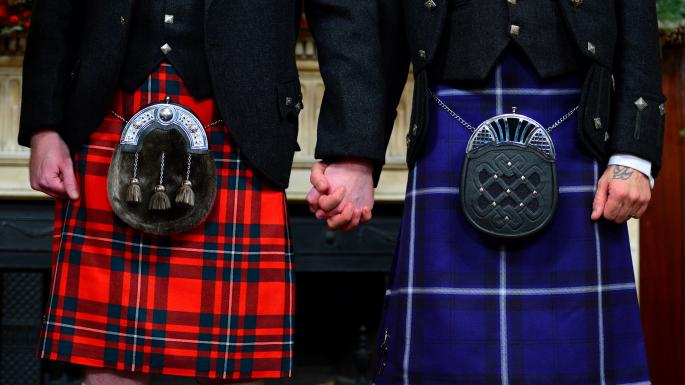At their next General Synod on June 9th, the Scottish Episcopal Church will vote on a proposal to allow clergy to preside at same-sex marriages.
Scotland’s third-largest church will take a vote on its position on Thursday 9 June.
Members will be asked to change a section of church law defining marriage as a “physical, spiritual and mystical union of one man and one woman”.
According to church documents, the change “would potentially allow the marriage of same-gendered couples in church in late 2017”, in line with same-sex marriage legislation passed in 2014.
The Most Rev David Chillingworth, Primus of the Scottish Episcopal Church, told The Times: “This is a legislative democratic process, so it is not really for me to say that it will happen, but I think that the proposal would not be put unless there was a reasonable chance that it would be approved.
The vote would have to happen in two steps: if it passes in June, it will need to be voted again in June, 2017.
ACNS:
A proposal to amend the marriage canon to permit same sex weddings in churches will be considered by the General Synod of the Scottish Episcopal Church next month. The proposed changes, which were requested by the Synod in 2015, remove the current definition of marriage in the first clause of the canon and adds a new “conscience clause” to prevent clergy opposed to the move from being forced to conduct same-sex weddings against their will.
The current Canon, C31, begins by defining marriage by stating: “The Doctrine of this Church is that Marriage is a physical, spiritual and mystical union of one man and one woman created by their mutual consent of heart, mind and will thereto, and is a holy and lifelong estate instituted of God.”
The proposed amendment to Canon C31 would replace that wording with a new clause which says: “In the light of the fact that there are differing understandings of the nature of marriage in this Church, no cleric of this Church shall be obliged to conduct any marriage against their conscience. . .”
The Synod is being asked to give the proposed amendment a first reading – this requires a simple majority in each house of Synod. If approved, it would return to the Synod next year for a second reading. This would require a two-thirds majority in each house. In between first and second reading, diocesan synods have the opportunity to make their views known on the proposals.
If passed, the Scottish Episcopal Church would be the largest denomination in the UK to allow same-sex marriage. Right now, the Quakers, Unitarians, and Free Christians, along with Liberal Judaism, allows same-sex marriage and Baptist congregations in the UK are allowed to decide for themselves whether to exercise the privilege.

